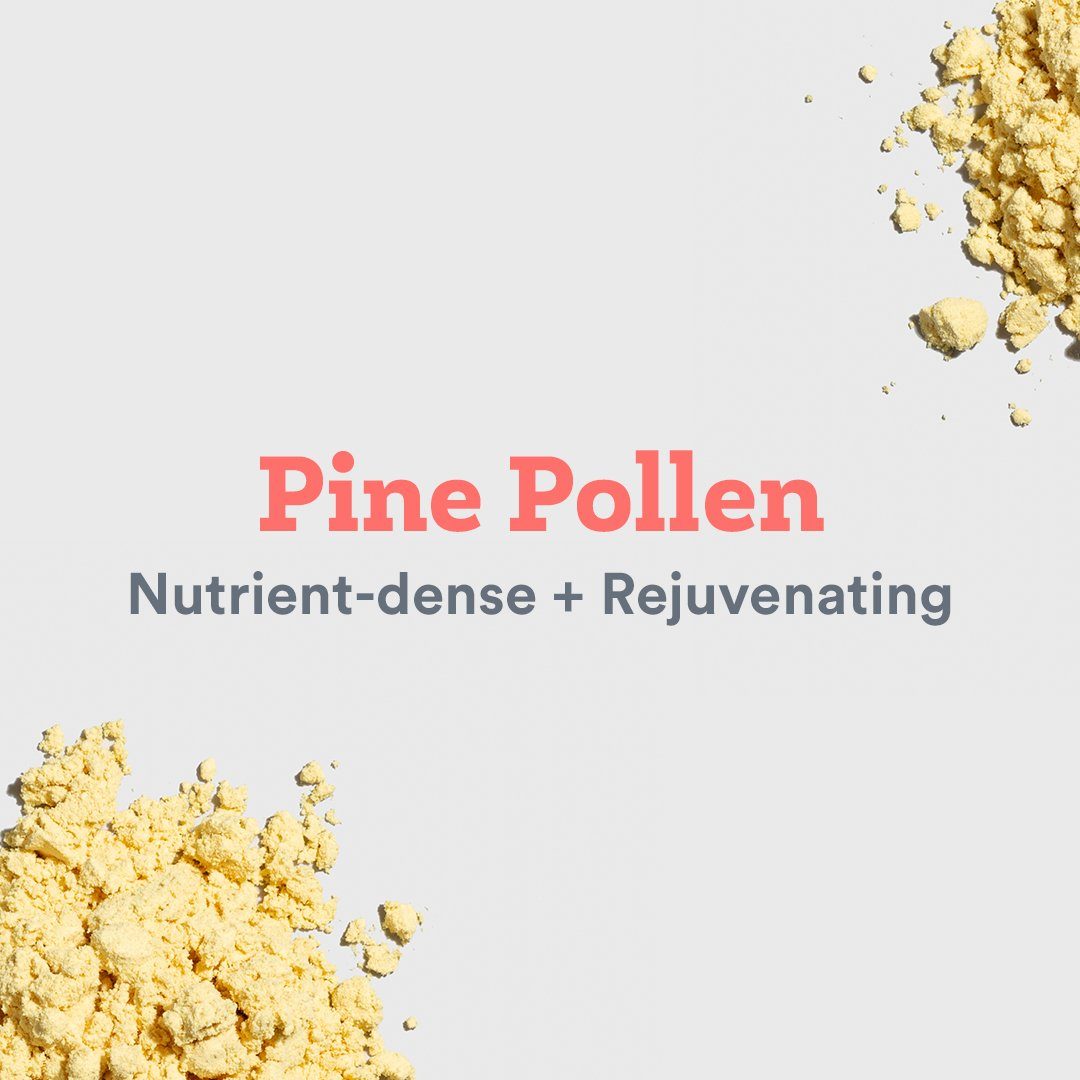
Scientific/Latin name: Pinus massoniana
Also known as: King of Pollen, Masson Pine Pollen, Chinese red pine, horsetail pine
Native to: Taiwan, China and Vietnam
Top benefits: Nutrient and antioxidant dense; longevity promoting

Pine Pollen, the Longevity Tonic
Let’s be honest: we’re all looking for a way to cheat the aging system. Even though we strive to take good care of ourselves, most of us wouldn’t be opposed to having an advantage in terms of living longer or at least avoiding some of the common pitfalls (like illness) that can come with aging.
While pine pollen might not be the fountain of youth, it is a natural and holistic solution that can help support overall wellness and keep your body in balance as you age. With antioxidant protection, hormonal support and nutrient-rich profile, it’s definitely the next ingredient you’ll want to add to your anti-aging routine.
We’ll share what it is, explain the benefits, and tell you how to add it to your everyday routine.
What Is Pine Pollen?
Pine pollen — being exactly as it sounds, the pollen of the pine tree — does not refer to any particular species of pine. While throughout the world pine pollen is derived from a number of different pine species, here we will review pollen from the Pinus massoniana tree, which has been one of the most revered herbs in Traditional Chinese Medicine (TCM) for millennia.
History of Use
This incredibly nutrient-dense superfood is considered a master rejuvenating herb and nutritive adaptogenic tonic in TCM. Renowned herbalist Stephen Buhner has said that “pine pollen, given its potency, its similarity to ginseng in some of its actions, and its status as, perhaps, the premier phytoandrogen on the planet, should have been recognized long before now as the powerful medicinal that it is…[pine pollen is a] potent overall tonic to the body…”.
In TCM, pine pollen is believed to invigorate Qi (vital energy or life force) and to have an affinity for the liver and spleen meridians: the liver being in charge of regulating the movement of Qi and bodily fluids, and the spleen being the Chinese equivalent to the body’s metabolism.
Pine pollen is also said to have many medicinal properties and functions, including reducing fatigue, improving cognitive function, liver protection and improving sexual function.
Health benefits of Pine Pollen
Pollen and pine cones get a bad rap. From coating our cars with yellow, sticky powder to making some people sneeze, it’s hard to believe we’d actually want to add this ingredient to our bodies to promote health.
The benefits of pine pollen, however, are impressive. Read on to learn more about our top favorites.
Antioxidants
If you’ve heard the term “antioxidants” and know they’re important for health, but not sure why, let us explain. Each day our bodies come in contact with external stressors like UV rays, pollution, cigarette smoke, and even toxic ingredients from some household cleaning supplies. These stressors result in the release of molecules in our bodies called free radicals.
Free radicals damage healthy cells, and that damage can be replicated when the cells proliferate. This damage, called oxidative stress, can underlie diseases and is also responsible for premature aging.
Protection from free radicals comes in the form of antioxidants. Antioxidants shield cells from free radicals, so the more antioxidants we have in our bodies, the better. In fact, antioxidant compounds have been shown to help protect against various metabolic diseases, heart disease, brain disorders and age-related syndromes.
Pine pollen contains important antioxidants, including glutathione and superoxide dismutase. (1, 2, 3) Antioxidant compounds have been shown to help protect against various metabolic diseases, heart disease, brain disorders and age-related syndromes
In an animal model study, pine pollen extracts were also found to protect the liver from oxidative stress, leading researchers to suggest that this action may be in part due to pine pollen’s ability to scavenge free radicals, increase antioxidant activity in the body and prevent the oxidative degradation of fats.

Nutrient-rich
The standard American diet is often void of nutrients. Fast food, quick and easy meals, and skipping meals altogether can often become our solutions when life gets busy. That leaves our bodies scrambling for the essential vitamins and minerals they need to thrive.
One of the biggest benefits of pine pollen is its vast array of nutrients. Rich in protein (11%), more than 20 amino acids (including all nine essential amino acids), fats (7%), dietary fiber (50%), hundreds of vitamins, minerals (like calcium, selenium, and magnesium), enzymes, and other nutrients that nourish the body at a fundamental level, pine pollen has been traditionally used as a dietary supplement for centuries.
BIOAVAILABILITY OF PINE POLLEN SUPPLEMENTS
Although pine pollen is a nutrient-dense superfood whose compounds are readily bioavailable to the body, the pollen grain is surrounded by a hard shell which acts as an armor for the pollen, keeping its nutrition inside its cell wall. There is debate as to whether human digestive juices can break this shell. Therefore, in many high quality pine pollen powders the cell wall is mechanically broken to ensure nutrient absorption.

Longevity Promoting
In TCM, pine pollen is a longevity tonic said to boost energy and immunity. It is rich in DHEA (a hormone produced in the adrenal glands that in turn helps the body produce other hormones, including testosterone and estrogen), and is thought to help balance the ratio of both androgen and estrogen hormones in the body, including testosterone levels, proving beneficial for both men and women.
Its large spectrum and high levels of nutrients, together with its hormone balancing effect, is said to endow pine pollen with adaptogenic benefits, helping to increase the body’s resistance to stress, and due to its restorative nature, promote immunity.
On a more energetic level, pine pollen is considered a Jing-enhancing herb in TCM, which loosely translates to 'vital essence'. As with herbs considered adaptogens in western herbal medicine, Jing tonics are used in any case when deep, nurturing rejuvenation is required: burnout from stress, exhaustion and symptoms resulting from hormone imbalance. In Daoism, Jing is thought to be expended over time and lost in many ways, but most notably through the loss of body fluids. The few prized herbs considered Jing-enhancing, including pine pollen (and He shou wu), are thought to restore Jing, and are therefore revered as superior longevity tonics.
Pollinate Your World
Thinking of pollen only as a group of allergens is a mistake. Pine pollen can be a healthy and important part of your health.
Pine pollen is loaded with essential vitamins, minerals, and macronutrients that make it a good solution for filling in nutritional gaps. It’s also a powerful antioxidant source that helps keep your cells thriving and protected against oxidative stress. That equates to healthier longevity, a goal practically anyone pines for.
Try adding a scoop of pine pollen-infused superfood powder to your existing meals and drinks or create new ones. Trying the antiaging effect of pine pollen for yourself is easy when you use products that fit into your lifestyle and routine.
The health research presented in this article is for informational use only. It is not a replacement for professional health advice and should not be construed as a recommendation of specific products. The products sold on this website are not intended to diagnose, treat, cure, or prevent any disease. This information does not provide dosage or format recommendations or possible drug interactions, and accordingly, should be used with the advice of a qualified health care provider.
Sources:
Preliminary Characterization, Antioxidant and Hepatoprotective Activities of Polysaccharides from Taishan Pinus massoniana Pollen | PMC
Characterization and Biological Activity of Taishan Pinus massoniana Pollen Polysaccharide In Vitro | PMC
Antioxidant and Antiinflammatory Activityof Pine Pollen Extract in Vitro | Online Librarty.Wiley.com
